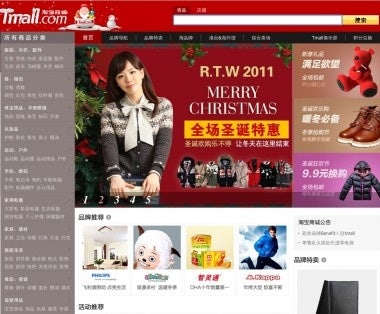Industry Expecting To Surpass 750 Billion Yuan (US$118 Billion) This Year#

Taobao's T-Mall is increasing its luxury offerings
Although China's e-commerce market continues to gain strength, with 173 million Chinese currently shopping online and the industry projected to surpass 750 billion yuan (US$118 billion) in gross merchandise value this year, an increasingly crowded playing field and stubbornly low profit margins mean the days of easy money are over. Using the example of Dongfeng Village in Jiangsu province, today Reuters details how the booming e-commerce market in China is becoming a battleground for a myriad of vendors, who find themselves in "race-to-the-bottom" price wars yet still have to provide the perks demanded by Chinese consumers.
Though the article focuses on the low-end of the market, looking mostly at individual Taobao sellers rather than major brands, the article provides good background to the current state of the e-commerce market in China:
Once the darling of private equity and venture capital firms, [China's e-commerce market] is now set for a period of intense competition and shake-out.
Money entering the sector and the relatively low barriers to entry have spawned a multitude of e-commerce companies that are jostling for consumers' attention. From shoes to junk food, there are an estimated 25,000 online stores in China.
"Every private investor, most of them with more money than sense, tends to think they can replicate the Amazon model in China. And so that is what really created the competition, this flood of capital," said Michael Clendenin, managing director at Shanghai-based consultancy RedTech Advisors.
...
Heavy spending on logistics, waging price wars, holding steep discount promotions and splurging on massive offline advertising are what it now takes to be an e-commerce player in China and to stay at the forefront of consumers' minds.
"It's going to be the guys with the most to lose who are going to win in the end. And what do they win? They win a business that is low margin. It's just so tough," RedTech Advisors' Clendenin said.
In a recent report, the Boston Consulting Group predicted that China would become the world's largest e-commerce market in 2015, the same year McKinsey expects the country to become the world's largest luxury market, and it's this confluence of e-commerce and luxury that may prove to be one of the most heavily contested yet most critical segments. As Jing Daily wrote in October, dozens of online retailers are now crowding the market, with domestic media portals like Sina and Netease, new upstarts like Shangpin, Zouxiu and ihush, and international players like Yoox jumping on the newest segment of the e-commerce bandwagon -- high-end retail. According to a report by iResearch, Chinese luxury e-commerce platforms received over 12 rounds of financing in the first half of 2011, raising a record US$283 million, raising the stakes in an already hotly contested market. As an Analysys International study recently noted, China’s luxury e-commerce market achieved 3.45 billion yuan (US$541 million) in the second quarter of 2011, adding that the expected annual turnover may reach 16 billion yuan (US$2.5 billion). Within the next two years, the study added, China’s luxury e-commerce sales should exceed 20 billion yuan (US$3.1 billion).
This projection, along with similar projections of growth in middle-class spending on high-end goods in the next five years, is enticing more multi-brand retailers and brands themselves to invest in e-commerce platforms specifically for the China market. This mad rush to set up shop and offer luxury goods at sometimes deep discounts (though inventory is far from vast) has engendered an e-commerce situation in China in which a true leader has yet to fully emerge. With dozens of luxury-focused online retailers to choose from, many of which are very well capitalized, the industry may be in dire need of a shakeout. As Torsten Stocker of the Monitor Group recently told Jing Daily, the relative chaos of the market indicates to him that “luxury e-commerce in China more on a natural evolution path, where new concepts and ideas are still being tested, and where it is still unclear what will work for which brand.”
In the year ahead, we would expect to see many e-commerce platforms that have recently gotten into the luxury realm retreat back to their "bread-and-butter" low- to mid-range sales. At the same time, we expect to see domestic players like Taobao's T-Mall -- which is currently hosting an official pilot "flagship" for Coach -- and international players like Yoox and its more niche sub-brand thecorner (which now features a "Vogue Talents Corner" with pieces by Chinese designers) consolidate their positions in the industry via better selection, authenticity guarantees, and online exclusives. While these industry "growing pains" may be tough for recent entrants to the luxury space, a shakeout will likely be ultimately good for Chinese consumers themselves, as market leaders are likely going to have to continue to increase service offerings (such as thecorner's courier service, which lets customers try on their purchases while a deliveryman waits) and stocking better inventory while still aggressively competing on price.
